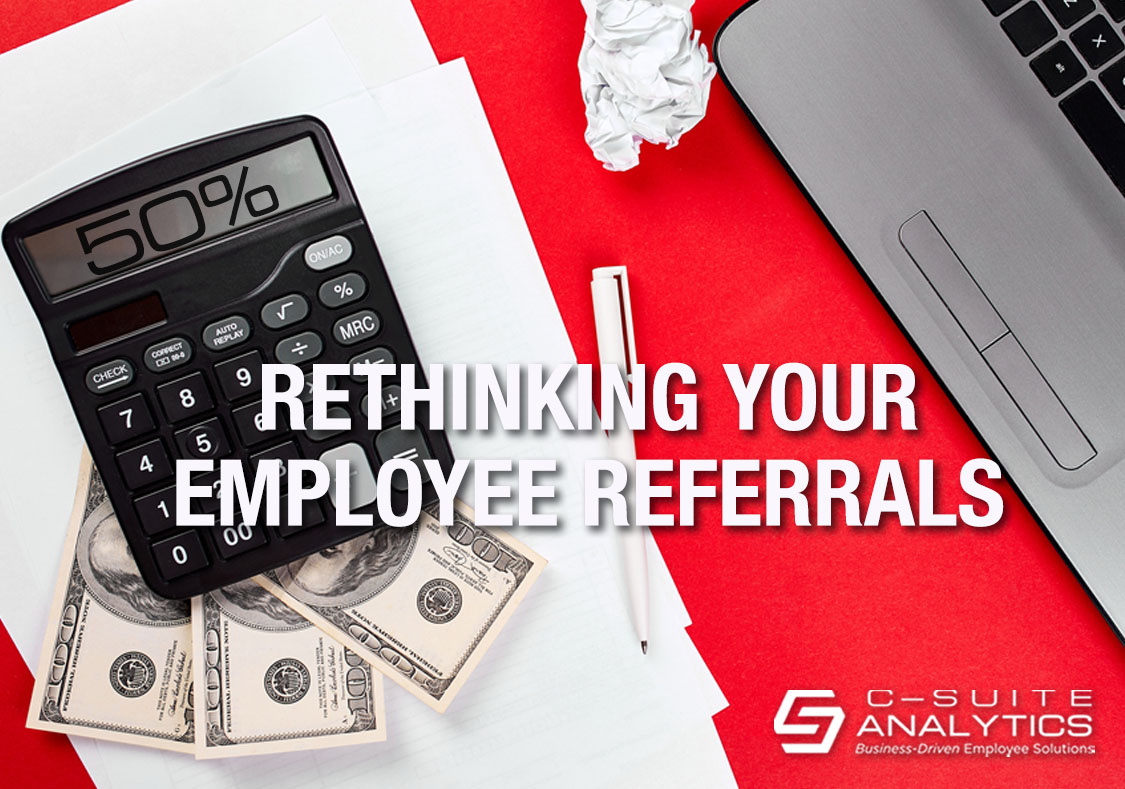Those who experience their work as a calling are most likely to feel a deep alignment between their vocation and who they are as a person. However, they are also most likely to act faster to leave than other employees when they have mistrust of management because they bring high degrees of expectations that escalates frustration quicker when stifled by a poor boss. What to do?
A Smart Approach to Increasing Employee Referrals

Last week I pushed employee referrals hard, given that qualified candidates…or any candidates… are so hard to find. We here at C-Suite Analytics consistently cut turnover by 30% and more, and referrals are just one of our strategies because of these same statistics I quoted last week: Employee referrals are 4 Xs more likely to be hired, save companies over $7,500 per hire, perform their jobs better than their peer employees…and most importantly for our purposes, stay longer.
Let’s together read that italicized sentence again. For most companies, gaining employee referrals is an afterthought. If I asked whether onboarding or referrals are more important for retention, those companies’ HR executives would say “onboarding”. Or they would also choose events with food…or pet insurance, my favorite benefit to pick on. The fact is that gaining employee referrals matters more than just a handful of the usual HR initiatives…especially when good candidates are so rare.
Let’s be bold here. As most companies are planning their 2022 objectives, make one of yours be to triple your percent of jobs filled by employee referrals.
We help our client companies do that by looking at nine criteria, and today we will focus on just one:
How much money do you pay the referring employee on their referred employee’s first day of work?
The initial answer for most companies is maybe a little but certainly not much because we don’t want to reward any employee whose referral doesn’t stay with us. Or some companies say we don’t pay a nickel until the referred employee stays with us 90 days or longer. Their logic goes like this:
- We will only pay hard dollars if the referring employee sends us someone who is a long-term keeper.
- We also want to avoid any conspiracy where both of those involved privately agree up front that the “new hire” will quit early and both will split the jackpot.
- And the referring employee will be motivated to coach the new hire to stay if dollars are on the table.
For the record, I agree with this last position…and with the first two above it, too, as long as the employees who you are looking to for referrals are in professional jobs and don’t live paycheck to paycheck.
But let’s suppose you are looking to increase referrals from manufacturing workers, call center agents, retail and restaurant employees…or any of our other occupations where workers are likely to see incoming dollars only in the framework of helping to pay this month’s bills. Three mind-grabbing statistics jump out here:
- 63% of our U.S. workers live paycheck to paycheck in our current covid-impacted country.[i]
- A full 70% of millennials live paycheck to paycheck and they are quickly becoming the largest segment of our workforce.[ii]
- Workers now need to make $42 an hour in order to spend the recommended quarter of their income on an average one-bedroom apartment…while the average hourly pay for restaurant workers for example is $11.52.[iii]
Let me make the argument, then, that your employee referral program offers no financial incentive for entry-level workers…or for most hourly workers…if you don’t pay a significant chunk of your total payment on the first day the referred new hire starts. So if most of the employees who you are incenting to refer others are paid by the hour, your employee referral program will fail.
Our Comprehensive Turnover Solution is designed to get results for companies like yours by cutting turnover 30% and more. Write me or connect with me if you want to learn more…DFinnegan@C-SuiteAnalytics.com.
Let’s next turn some other traditional thinking about referral programs on its ear by asking this:
Who is responsible for ensuring a referred employee stays with your company for a designated period of time?
Or said another way with a cynical smirk, is tying the referring employee’s payout to the referred employee’s length of service an honorable and fair strategy…or is it just a way to save a few bucks if the newly-hired employee quits early?
Referring employees are not hiring experts, nor can they impact how your managers will treat referred employees. You do, however, have hiring experts in HR recruiting and most managers have ideally developed skills to identify how long an employee will stay. And it is that manager who has the most impact on that new-hire’s length of service. So it seems fair to ask why should the referring employee be on the hook for how long the new hire they refer stays. And instead, why shouldn’t the HR recruiter and the referred employee’s manager be on that same hook?
So the recommendation here becomes clear: Pay at least half of the total reward to the referring employee on day one, especially if that employee is paid by the hour. Otherwise your referral program begins with a fatal flaw…at a time when you’ve never needed employee referrals more.
[i] https://www.cnbc.com/2020/12/11/majority-of-americans-are-living-paycheck-to-paycheck-since-covid-hit.html
[ii] https://www.businessinsider.com/broke-millennials-living-paycheck-economic-crisis-savings-spending-survey-2021-6#:~:text=Economy-,70%25%20of%20millennials%20are%20living%20paycheck%20to%20paycheck,more%20than%20any%20other%20generation&text=70%25%20of%20millennials%20say%20they,but%20not%20yet%20peak%20earnings.



